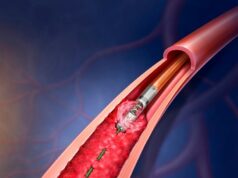
Medtronic plc has announced the full commercial launch of the IN.PACT Admiral drug-coated balloon (DCB) in Japan. The launch follows the completion of a post-market clinical trial, which enrolled 300 patients.
IN.PACT Admiral received approval last year from the Japanese Ministry of Health, Labour and Welfare (MHLW) for the treatment of peripheral arterial disease (PAD) in the superficial femoral arteries (SFA) and popliteal arteries. The MHLW also granted reimbursement approval for the IN.PACT Admiral in December of 2017.
“In Japan, there is a significant need for new technologies to safely and effectively treat PAD,” says Tony Semedo, president, Medtronic Japan. “Earlier this year, we presented both one- and two-year results from the IN.PACT SFA Japan study, representing consistency in clinical data shared on IN.PACT Admiral to-date. Now with the completion of our post-market study, we will become the first company to bring DCB technology to Japanese physicians and their patients.”
Approval for IN.PACT Admiral in Japan was based on data from MDT-2113 (IN.PACT SFA Japan), which enrolled 100 patients across 11 sites and randomised treatment to either DCB (n=68) or standard percutaneous transluminal angioplasty (PTA) (n=32). The results were consistent with one-year findings from the pivotal IN.PACT SFA Trial, showing a low clinically-driven target lesion revascularisation (CD-TLR) rate and high patency rate.
IN.PACT SFA Japan demonstrated 93.9% primary patency in the DCB group as compared to 46.9% in the PTA group at one year based on Kaplan-Meier Estimate (p<0.001). Additionally, one-year results showed a CD-TLR rate of 2.9% for the DCB group compared to 18.8% in the PTA group (p=0.012). In IN.PACT SFA Japan, major adverse events were also lower for the DCB at one year (4.4% compared to 18.8% in the PTA group; p=0.028), with no major target limb amputations or all-cause death in both treatment groups.
Most recently, two-year data from IN.PACT SFA Japan were presented at the Leipzig Interventional Course (LINC; 30 January–2 February, Leipzig, Germany). Results were also consistent with two-year findings from the IN.PACT SFA Trial.
The IN.PACT Admiral drug-coated balloon has been approved in Japan to treat de novo and non-stented restenotic lesions with length <=200mm in superficial femoral and popliteal arteries with reference vessel diameters of >=4mm and <=7mm. The DCB’s primary mode of action is physical dilatation of the vessel lumen by PTA, and the proven paclitaxel drug is intended to reduce restenosis.












